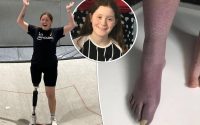My baby’s skull was broken into pieces — scary condition parents should know about
A mom recalled the excruciating moment doctors had to break her baby son’s skull into pieces due to a rare birth defect.
Brittany Bevans, 29, was told that her boy would have to have major surgery in order to save his eyesight and help with seizures.
Louie was just 5 months old when he was diagnosed with craniosynostosis — a condition that occurs when the bones in a baby’s skull join together before the brain is fully formed.
According to the Centers for Disease Control and Prevention, the rare birth defect affects about one in every 2,500 births.
“It was my greatest fear,” Bevans told NeedToKnow.co.uk Monday. “It was overwhelming to consider that my baby would have to undergo such a complex and risky procedure.”
Louie was diagnosed with the condition in December 2021 — but Bevans’ maternal instincts told her something was wrong long beforehand, even though her concerns weren’t taken seriously by a pediatrician.
“We first became aware of an issue with the shape of Louie’s head shortly after his birth,” she said of the fears she and husband, Daniel, 32, experienced. “Despite our concerns being raised, we were consistently told that it was simply a case of ‘birth head.’ Unfortunately, over time, his head shape did not improve and in fact appeared to worsen.”



The family live in Australia, and a concerned Bevans subsequently took her son to the craniofacial team at the Royal Children’s Hospital in Melbourne.
“The worry consumed me every day, and I constantly examined the shape of his head,” Bevans admitted. “As I delved into research on the condition, I realized how serious it could be if left untreated.”
Without surgical intervention, craniosynostosis can lead to brain damage, developmental delays, blindness, cognitive impairment, seizures and headaches, according to the Mayo Clinic.
“This is why I felt it was crucial to advocate for Louie and other parents and children facing the same issue. If I hadn’t trusted my instincts and followed up with doctors, I shudder to think what might have happened to Louie,” Bevans said. “These nagging doubts motivated me to seek answers and I am so grateful that I did.”



Sure enough, little Louie was diagnosed with craniosynostosis, with doctors saying he would need a cranial vault reconstruction.
The serious seven-hour operation took place in October last year.
In cranial vault reconstruction, doctors make an incision along the baby’s scalp, remove the affected bone, and reshape and replace the bone to improve head shape and allow more space for the developing brain, according to Johns Hopkins Medicine.
“The idea of his skull being cut open, broken apart and reconstructed filled me with intense anxiety. The constant worry took a toll on my mental health and two months after Louie was born, I was eventually diagnosed with postnatal anxiety,” Bevans shared. “This was undoubtedly the most challenging and difficult period of my life.”
Louie received over 60 stitches and two blood transfusions and stayed in the hospital for five days for recovery. Thankfully, he has made a full recovery and is “doing great” seven months on from the procedure.


“He’s a super happy and energetic toddler!” Bevans revealed. “While he may have hit a few milestones a bit later than usual, his body was focused on healing after a major surgery, so we’re not too concerned.
“That being said, we want to make sure we stay proactive and address any potential speech-related issues, which is why we’ll be visiting a speech therapist,” she added.
Bevans admits that she’s extra cautious when her son isn’t feeling his best, but she chalks that up to natural motherly instinct.

Bevans wants to help inform other parents about craniosynostosis through her TikTok account where she has 24,300 followers and 1.1 million likes.
“As a parent, I have seen first-hand the lack of education and understanding surrounding this condition within the medical field,” she said. “Through my TikTok platform, I have shared my son’s experience with craniosynostosis, and I have received overwhelming support from other parents who have faced similar challenges.”


